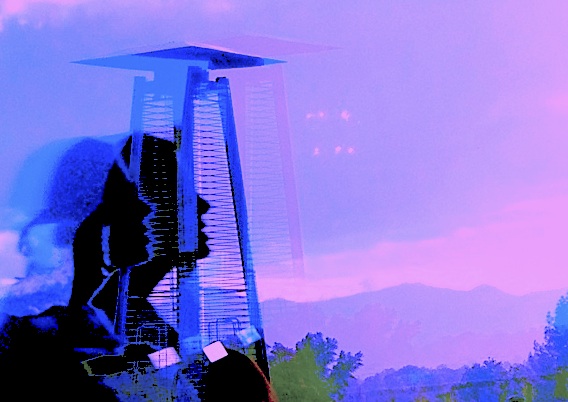In the first post for this column, we looked at a “science of change” and some general principles that we think will be useful as we undertake the tasks of social change by peaceful, democratic means. We suggested that a compelling new vision of the human future will be a necessary first step, and we recommended an approach that we will now define as a syntropic strategy.
Here we define Syntropy [ (Gr.) syn-together, (Gr.) trop-turning toward…] simply as turning together toward a universally acceptable goal. This entails an integration of a values-based purpose together with a skeptical attitude informed by both a constructive and an experimental approach. If this purpose is accepted by enough people it could successfully advance our understanding of our species and our place in the Universe. The syntropic strategy could then lead to the long-awaited reunion of the human family, preserving and protecting the uniqueness of each culture while emphasizing our common interests.
We nominate for the above-mentioned Universal Goal (or Purpose) a value that we perceive as already present in the fundamental nature of Life. This nature can be seen in our genes, our protoplasm and our ecological, social, cultural, and central nervous system processes. Our proposed Universal Purpose, we predict, will increasingly become a conscious determinant at several levels in the minds of humanity as a desire to achieve an ever greater adaptive and creative intelligence. Since our global ecosystem and our Universe is constantly changing it is appropriate that our Universal Purpose also be dynamic and changing in its material manifestations while remaining permanent in its underlying principles.
In today’s world the means of achieving any “larger purpose” seems to have narrowed to three basic models of human organization each of which has a long and varied history: (1) rules of governance revealed to one or a few humans by an alleged supernatural being, (2) governing control by a self-appointed “wise and benevolent elite,” and (3) democracy, or “rule by the people.” While the first leads to divided systems each claiming to be based on the will of God, the second system often pretends to be the third, and the latter often serves as a cloak to conceal the aims of those who wish to install themselves as a controlling elite, we will argue that the historical evidence supports the ideal of democracy if not all of the current, half-hearted versions of “democracy,” i.e., the polyarchies that claim to be democracies. The happiest, healthiest, and best-educated people tend to be those who live in democratic societies that come closest to the ideals of democracy: freedom, equality, and universal participation in self-governance.
No society is perfect, however, and we submit that the evidence from psychological and social studies strongly suggests that having and sharing a sense of purpose, along with a constructive and experimental attitude toward solving life’s problems, will best increase the happiness quotient, promote greater longevity, and increase adaptive and creative intelligence at the individual, societal, and global levels.
At this point, it is vitally important that we neither hesitate nor give up our quest for a better world. It will take time, and we do not have time to spare. Taking just one of the global catastrophic risks of human extinction as an example: the amount of CO2 already in the pipeline will continue heating the Earth’s climate for hundreds of years—even if we stopped adding CO2 to the atmosphere right now.
Quoting now from the book Creating Democracy In Time (1994):
“…it is worth recalling that when we undertake the task of changing either our individual selves or the whole world system, we have little foreknowledge of the length of time that might be needed to accomplish our objectives. Because the truest democracies are more adaptively intelligent than other forms of government, creating democracy in time, i.e., before our time runs out, is an essential issue. Each personal moment devoted to these goals is precious—a goal in and of itself. Our educational systems should teach these values and related strategies above all else.
“Human evolution, hopefully, will be a continuous process that will flow like an increasingly beautiful tapestry over thousands or millions of years to come. Every conscious contribution from each of us becomes a part of the magic loom with which we weave human destiny. We may one day create a ‘paradise on Earth.’ If we survive the 21st century we will almost certainly strive to carry the seeds of our species to other worlds in the galaxy. One whole lifetime—itself a brief event—is the most that one person can give to that process. Fortunately, it is not necessary that anyone give more than a little. If we can organize ourselves syntropicly, our routine daily activities will add up to enough…
“…The projected crises that will endanger human survival in the 21st century are based in large part on the idea that the West and North [and by now the East and South] will continue to reproduce and consume out of self-interest. If, as we see conditions changing around us, we can shift quickly to behavior based on shared interests and goals, then we can prevent the collective ensemble of individually selfish acts from driving the human species, like proverbial lemmings, into the sea.
“…In relation to the complexity of our task and the time it will take us to adapt, the words of anthropologist Edward Shils—although taken from a different context—are especially valuable for their sobering [yet hopeful] effect:
‘The development of a modern polity calls for a redefinition of the image of the self, a redirection of the cognitive categories, new capacities in relation to time and task. These constitute opinion of a deeper sort. They must first be firmly developed in the minority on whose initiative and persistent action…development depends in the first instance. The development of integrity and skill in administrative judgment; the development of cadres of reasonably punctual, reasonably honest, reasonably dutiful persons; and the growth within a small circle of a viewpoint that regards the entire…community as the first object of its public solicitude—all these take time. They take time because they depend on the formation of fundamental dispositions and of traditions in institutions, of traditions within families, educational bodies, business enterprises, and government departments. Even though they do not have to be created in [everyone], they cannot be created quickly, for they are formed only through study, practice, and personal interaction, processes which [under normal conditions] require years…’ [brackets mine]

